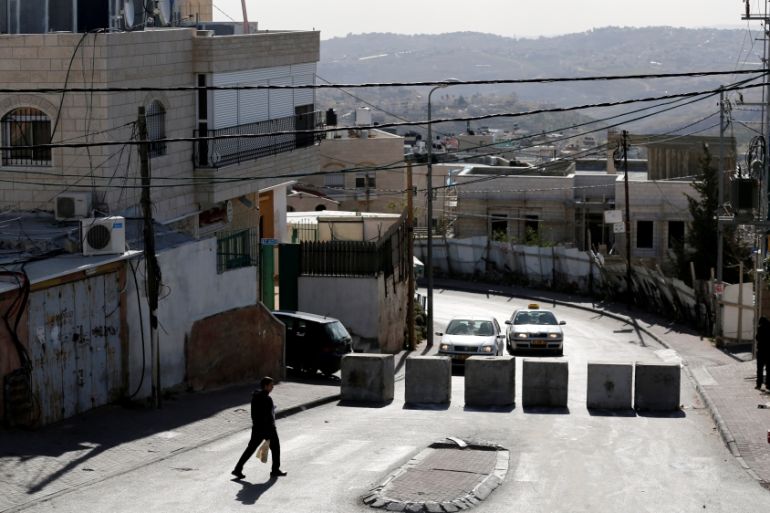Israel’s collective punishment follows Jerusalem attack
Restrictions have been tightened for all residents of Jabal Mukaber after deadly truck ramming incident.

Jerusalem – Israeli police have imposed restrictions on a number of Palestinian neighbourhoods in occupied East Jerusalem after a deadly truck ramming attack on Sunday, which left four soldiers and the Palestinian attacker dead.
Hours after the incident, Israeli security forces surrounded Jabal Mukaber, an East Jerusalem neighbourhood that had been home to the 28-year-old attacker, Fadi al-Qanbar. Police established a cordon around the community, including a concrete blockade at one of the main entrances and checkpoints at other entry and exit points. The restrictions remained in place on Tuesday morning.
Keep reading
list of 4 itemsRussia-Ukraine war: List of key events, day 782
‘Crimes against humanity’ may have been committed in Sudan, says UN chief
The Take: How Iran’s attack on Israel unfolded
“They closed the street with cement blocks. There was an increase in the police presence – they stopped and searched vehicles and inspected identity cards,” Atta, a local resident who did not provide his last name, told Al Jazeera.
“Many couldn’t reach work. I, for example, had to leave my car behind and walk on foot to the main road because of the cement blocks. You could feel the police were on high alert and that they were trying to punish us for what happened.”
INTERACTIVE: Broken homes – A record year of Israeli demolitions
In a statement on Monday, Israeli police spokesperson, Micky Rosenfeld confirmed that there were “heightened police security operations taking place in a number of Arab neighbourhoods” across Jerusalem.
Police also prevented Qanbar’s family from setting up a memorial tent outside the family home in Jabal Mukaber, and locals said the family had been barred from receiving mourners at their home, where a heavy police presence remained in place on Tuesday.
In October 2015, the same neighbourhood was closed off for weeks after a handful of young men from Jabal Mukaber carried out attacks on Israeli security forces and civilians in Jerusalem. In response, Israeli security forces installed a temporary concrete wall across a main entrance and manned other checkpoints.
|
|
“Every time something happens, Israeli police do the same. There is no reaction [from the residents] because they are always expecting the worst and feel that they will always be punished and neglected,” Atta said.
Funerals were held on Monday for the four Israeli soldiers who were killed in the attack.
Three members of the Qanbar family arrested after the attack had their detention extended by an Israeli court on Monday. Two of Qanbar’s brothers, Munther and Mohammed, and one cousin will remain in jail until at least January 15. Two other family members detained in the hours after the attack have since been released.
Israeli authorities have announced a number of measures aimed at punishing the Qanbar family, including withholding his body and preventing a public funeral. They also announced that they would demolish Qanbar’s home as soon as possible, and that family reunification processes for his relatives would be cancelled immediately.
READ MORE: ‘Bad Palestinians’ under Israel’s collective punishment
The motivation behind the attack remains unclear and no organisation has taken responsibility. Israeli prime minister Benjamin Netanyahu and defence minister Avigdor Lieberman claimed that Qanbar had links to the Islamic State of Iraq and the Levant (ISIL, also known as ISIS) group, but provided no evidence to support the claim.
Family members have dismissed allegations that Qanbar was motivated by ISIL.

“There was nothing in his life saying he was ISIS. He never contacted ISIS and doesn’t know ISIS,” cousin Mohamed al-Qanbar, 43, told the AFP news agency. “We were shocked, for sure. We never expected anything like this from Fadi.”
Contacted by Al Jazeera, family members declined to comment further.
Analysts in Israel have stressed the differences between Palestinian violence and attacks carried out by ISIL, noting that anger over Israel’s ongoing occupation of the West Bank and East Jerusalem is a far more common motivator than religion.
“I don’t think that the Islamic State has anything to do with it and I am sceptical whether he has any connection to the Islamic State,” said Yoram Schweitzer, senior research fellow at the Institute for National Security Studies (INSS). “I think it is being done too hastily, to compare the attacks in Nice and Germany, with this case.”
Israel has carried out numerous punitive home demolitions against the families of Palestinian attackers since 2014, despite widespread criticism from international and domestic rights groups, who argue that the practise is unlawful and amounts to “collective punishment” against people not accused of any wrongdoing.